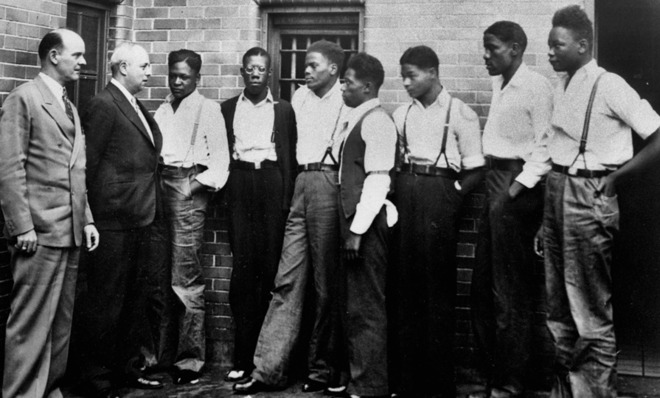The posthumous Scottsboro pardons: Too little, too late
It's a nice gesture by the Alabama parole board. But it's just a gesture.

A free daily email with the biggest news stories of the day – and the best features from TheWeek.com
You are now subscribed
Your newsletter sign-up was successful
It's been 80 years since nine innocent black teenagers, ranging in age from 13 to 19, were falsely accused of raping two white women. This week, the last of their convictions were finally pardoned.
On Wednesday, Alabama’s parole board approved the posthumous pardons of Charles Weems, Andy Wright, and Haywood Patterson, the final three members of the Scottsboro boys whose names hadn't been cleared.
“The decision will give them a final peace in their graves wherever they are,” Sheila Washington, director of the Scottsboro Museum and Cultural Center, told the Montgomery Advertiser.
The Week
Escape your echo chamber. Get the facts behind the news, plus analysis from multiple perspectives.

Sign up for The Week's Free Newsletters
From our morning news briefing to a weekly Good News Newsletter, get the best of The Week delivered directly to your inbox.
From our morning news briefing to a weekly Good News Newsletter, get the best of The Week delivered directly to your inbox.
It's a nice thought. But the gesture can only be considered too little, too late. Posthumous pardons may give comfort to a town that still bears the scars of hosting one of the most racist and blatantly biased trials in history. But it will never reclaim the years lost by the young men sitting on death row.
Even more unfortunate is the fact that few Americans understand all the details and nuances of Scottsboro, because the case was so drawn out and tangled in the court process, reaching as high as the Supreme Court. The mess took close to two decades to sort out. There were 16 trials, and six to 17 years in prison for each of the young men before they were all out of jail.
While traveling on a freight train to Memphis in March of 1931, the nine boys got in a fight with a few white ones. After the dust-up, two women, one 17 and the other 21, claimed that all nine had raped them. It took only five days for a grand jury to indict all of them, and just another nine for all of them to be convicted of rape and sentenced to death, except the youngest whose case ended in a hung jury.
The case spiraled into appeals and follow-up trials as the teenagers spent their prime years on death row. Racism immediately poisoned the public’s opinion, and Jim Crow stacked the courts against the Scottsboro boys. Only white men were included on the original juries, which led the Supreme Court in the 1935 decision Norris v. Alabama to overturn many of the verdicts, citing the fact that black jurors were specifically excluded from jury rolls.
A free daily email with the biggest news stories of the day – and the best features from TheWeek.com
However, even though Alabama was forced to include African Americans on the rolls, the state still kept them off juries. For one of the 1936 trials, F. Raymond Daniell reported in the New York Times that Alabama’s Lieutenant Governor Thomas E. Knight Jr. stepped in “more to protect the Jim Crow jury system [and] see to it that all colored men were eliminated.”
Eventually, all of the men made their way out of prison, but many never recovered from the strain and stigma of the trials. Andy Wright was paroled in 1943, but when he returned to Alabama he was jailed until 1950. His brother Roy, the youngest of the nine, killed his wife and then himself in 1959. Haywood Patterson was jailed for killing a man in a barroom brawl, and died in prison at the age of 39. Willie Roberson had an IQ of 64 — legally mentally retarded — and the time and date of his death are unknown. Olen Montgomery tried to create a music career, but after struggling, spent his final days drinking away his frustrations.
So, yes, it is a nice gesture that Alabama has posthumously pardoned the last of the Scottsboro boys, and the state should be commended for making an extra effort to amend for the past. But the truth is, the state can’t change history. The best these posthumous pardons can be is a reminder not to repeat it.
Emily Shire is chief researcher for The Week magazine. She has written about pop culture, religion, and women and gender issues at publications including Slate, The Forward, and Jewcy.
-
 James Van Der Beek obituary: fresh-faced Dawson’s Creek star
James Van Der Beek obituary: fresh-faced Dawson’s Creek starIn The Spotlight Van Der Beek fronted one of the most successful teen dramas of the 90s – but his Dawson fame proved a double-edged sword
-
 Is Andrew’s arrest the end for the monarchy?
Is Andrew’s arrest the end for the monarchy?Today's Big Question The King has distanced the Royal Family from his disgraced brother but a ‘fit of revolutionary disgust’ could still wipe them out
-
 Quiz of The Week: 14 – 20 February
Quiz of The Week: 14 – 20 FebruaryQuiz Have you been paying attention to The Week’s news?